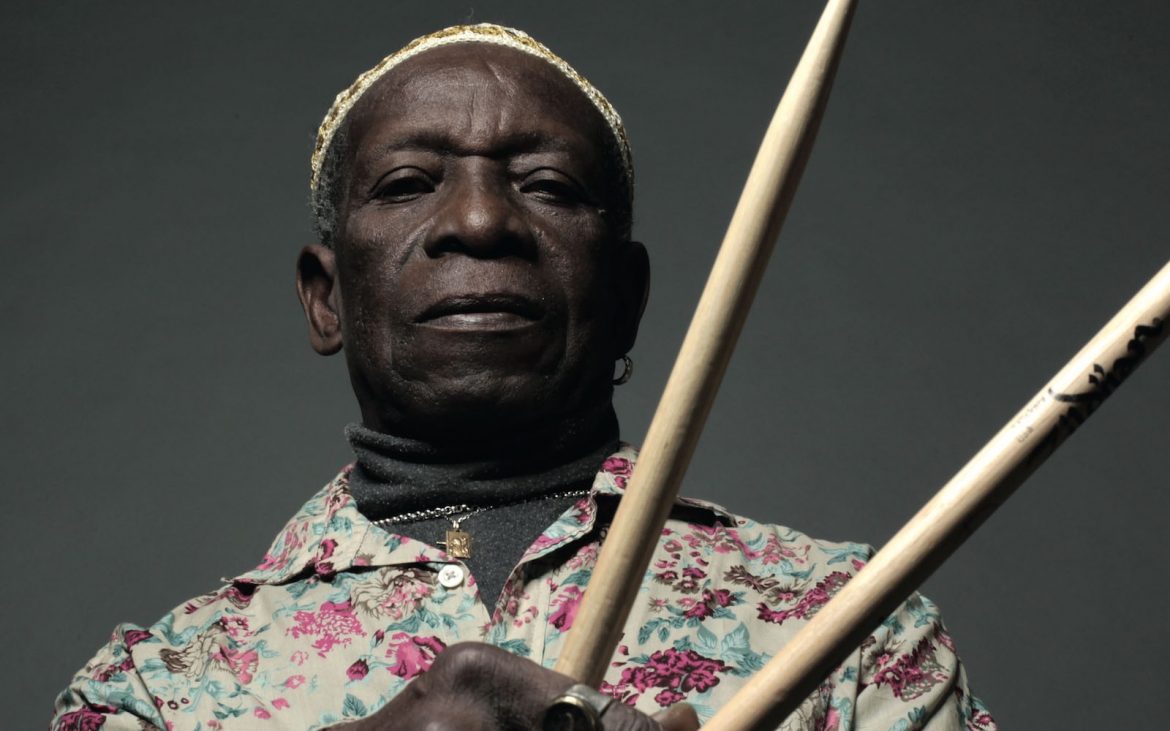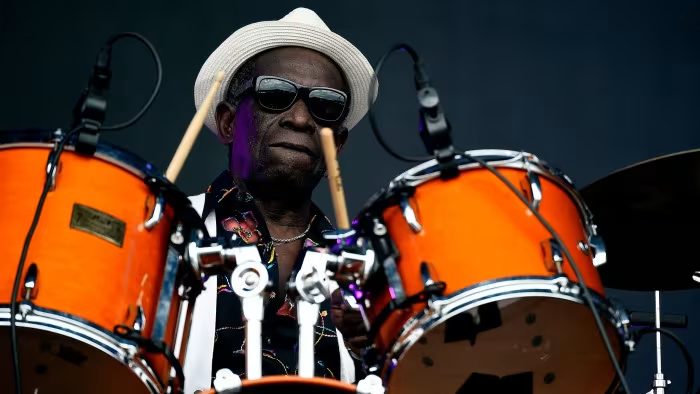
Tony Allen was a Nigerian drummer, composer and songwriter who lived and worked in Paris, France.
Tony Allen was born Tony Oladipo Allen in Lagos, Nigeria on August 12, 1940, and began playing drums at the age of 18, while working as an engineer for a radio station. He was influenced by the music his father who listened to Jùjú, a popular Yoruba music from the 1940s, but also American jazz, and the growing highlife scene in Nigeria and Ghana.
Tony Allen worked hard to develop a unique and distinctive style on the drums, feverishly studying records and magazine articles by the likes of Max Roach and Art Blakey, but also the revolutionary Ghanaian drummer Guy Warren (who was later known as Kofi Ghanaba, and developed a highly sought-after sound that mixed tribal Ghanaian drumming with bop, and worked with jazz legends Dizzy Gillespie, Charlie Parker, Thelonious Monk and Max Roach).
Allen was hired by “Sir” Victor Olaiya to play with his highlife band, the Cool Cats, and later played with Agu Norris and the Heatwaves, the Nigerian Messengers, and the Melody Makers.
In 1964, Fela Kuti asked Tony Allen to audition for a jazz-highlife band he was forming. He and Allen had played together in several bands in the Lagos music circuit, and Fela Kuti complimented Allen’s unique sound saying “How come you are the only guy in Nigeria who plays like this – jazz and highlife?” And so Tony Allen became an original member of Fela Kutii’s “Koola Lobitos” highlife-jazz band.
Following a turbulent but educational trip to the United States in 1969, Tony Allen served as the musical director of Fela Kuti’s band, Africa ’70, which developed a new militant African sound, mixing the heavy groove and universal appeal of soul with jazz, highlife, and the polyrhythmic template of Yoruba conventions. Tony Allen developed a novel and unique style to complement Fela Kuti’s new African groove that blended these disparate genres.
Tony Allen recorded more than 30 albums with Fela Kuti and Africa ’70. But by the late 1970s, dissension was growing in the ranks of Africa ’70, with arguments over royalties, pay and recognition growing in intensity.
As inventor of the rhythms that underpinned Afrobeat and musical director, Tony Allen felt especially upset. Fela Kuti stood his ground, stating that he would get the royalties for his songs. Although Fela supported Allen’s three solo recordings “Jealousy” (1975), “Progress” (1977) and “No Accommodation for Lagos” (1979), Tony Allen chose to leave Africa ’70, in 1979, taking many of the members with him.

Allen formed his own group, recording “No Discrimination” in 1980, and performing in Lagos until emigrating to London in 1984, and then later moving to Paris.
After leaving Africa ‘70, Tony developed an even more hybrid sound, deconstructing and fusing Afrobeat with electronica, dub, R&B, and rap, which he referred to as afrofunk.
Allen returned with a much anticipated new project for his 13th release, which was recorded live in Lagos, with a full-sized Afrobeat band. “Lagos No Shaking (Lagos is OK)” was released on 13 June 2006 and signified Allen’s return to his roots in Afrobeat after forays into avant-garde electronica hybrids.
In 2002, Tony Allen appeared on the Red Hot Organization’s compilation album “Red Hot and Riot”, in tribute to Fela Kuti, on a track called “No Agreement.”
In 2004 Tony recorded with French electronic artist Sébastien Tellier on the album “Politics” including the hit song “La Ritournelle”.
In 2006, Tony Allen joined with Blur frontman Damon Albarn, The Clash’s bassist Paul Simonon, and The Verve’s guitarist Simon Tong as drummer for The Good, the Bad & the Queen.
Allen played drums on two tracks on the 2007 album 5:55 by Charlotte Gainsbourg: “5:55” and “Night-Time Intermission”, backed by French duo Air and Jarvis Cocker of Pulp.
He was a featured artist on Zap Mama’s albums “Supermoon” (2007) and “”ReCreation (2009), adding his sound to the tracks “1000 Ways” and “African Diamond.”
Tony Allen collaborated with Albarn and Red Hot Chilli Peppers bassist Flea in a project called Rocket Juice and The Moon with an album released in 2012. Damon Albarn collaborated with him again for the single “Go Back”, which was Tony’s album “Film of Life”, released in October 2014.
In 2017, he released “A Tribute to Art Blakey & the Jazz Messengers”, a four-song EP on Blue Note Records featuring a reworked Afrobeat version of Art Blakey’s “Moanin'”.
In 2020, Allen featured on the Gorillaz track “How Far?” alongside Skepta, as part of the band’s Song Machine series.
Tony Allen has influenced a range of artists across a number of genres. Fela Kuti once stated that, “without Tony Allen, there would be no Afrobeat.” And he was described by Brian Eno as “perhaps the greatest drummer who has ever lived.”
On April 30, 2020, Tony Allen died of abdominal aortic aneurysm at Georges Pompidou European Hospital in Paris, aged 79.
Check out Tony Allen on Amazon
If you found this article interesting please share it with your friends and family, and why not read some more of our articles on Musicians who died in 2020.
.

